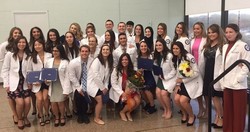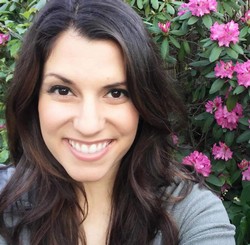Known for its mobility across different fields, autonomous role, competitive salary, and ability to provide a work-life balance, the Physician Assistant (PA) profession has become increasingly desirable throughout the years.
PAs are dependent health care providers licensed to practice medicine under physician supervision. Though they are considered dependent providers, they independently obtain medical histories, order diagnostic testing, conduct medical examinations, develop diagnoses, and formulate treatment plans.
As the interest in the profession rises, so does the level of competition surrounding matriculation into PA educational programs. Expectations are set at a high standard in regards to requirements such as GPA, GRE, and prior pertinent experience.
Bernadette Dunphy Ph.D., Specialist Professor and Director of Monmouth’s pre-health advising agrees, “A successful applicant has many, many clinical hands-on experience hours. Sometimes these hours are in the thousands. The best type of experience is EMT, nurse’s side, scribe positions, and other jobs that the student works directly with patients.”
The application process consists of meeting the required prerequisites, developing the application, sharing an interview with the admissions committee and hopefully, being matriculated into the program.
A large majority of PA programs accept applications online via a system termed the Centralized Application Service for Physician Assistants (CASPA). This system was developed in order for applicants to easily apply online to multiple programs at once.
 An important component of the CASPA application is an obligatory essay. To write this essay, be yourself—let your voice be heard through your narrative. Be sure to proofread, provide evidence to support your claims, organize your essay into a unique structure or theme, and get a second opinion before submitting.
An important component of the CASPA application is an obligatory essay. To write this essay, be yourself—let your voice be heard through your narrative. Be sure to proofread, provide evidence to support your claims, organize your essay into a unique structure or theme, and get a second opinion before submitting.
It is highly recommended that applications be submitted well before their deadline, since many programs carry out rolling admissions. Rolling admissions cease the admissions process as soon as the program has reached their desired number of applicant interviews.
Dunphy said, “Be prepared to apply when the application service CASPA opens…look at the prerequisites of the schools early to make sure you have all the classes necessary because they vary from school to school.”
She continued, “Make sure you have your letters of recommendation set up early and they are faculty and clinicians that know you best and they are willing to write you a strong positive letter.”
Monmouth University’s PA program begins in September and spans for 36 months. It includes a 42-week didactic phase during which students gain classroom and clinical laboratory instruction as well as experiences within hospitals and clinics.
Following the didactic phase is a 64-week clinical phase during which students are assigned to preceptors within several hospitals and physician offices to participate in clinical clerkships. While programs may offer up to 125 seats, Monmouth has a class size of 30 students enrolled for three years.
Stephanie Lynch PA-C., a Specialist Professor of the PA program, explained, “The students form close relationships with each other and the faculty. Because of the small class size, students at our PA Program don’t feel like just a number in a cohort. Most students feel very supported by the faculty.”
The team-based approach to medical care is represented by the collaborative atmosphere found within Monmouth’s PA program. Another perk of the program is the inclusion of two summer breaks.
“The students find these breaks to be very restorative after completion of the rigorous didactic year and the extended first year of clinical rotations,” Lynch explains.
The Monmouth University Physician Assistant Student Society (MUPASS) aims to promote academic and clinical excellence while simultaneously emphasizing the importance of the PA as a component of the health care delivery team.
Lynch explained, “MUPASS is also involved in multiple outreach programs benefiting the local community, including: making dinner for the families at the Ronald McDonald House at Monmouth Medical Center, participating in “Trunk or Treat” which offers area children a safe place to trick or treat on Halloween, working at a local food bank in Asbury Park, and donating Christmas presents to families in need through Operation Sleighbells.”
Throughout the next decade, the PA profession has an excellent projected job outlook of 31 percent. PAs typically do not struggle to find job placements, given their high demand.
Monmouth alumna Francesca Cuttaia (PA-C) earned a Bachelor of Science in Health Studies in 2010 and currently works at Children’s Hospital of Los Angeles in Neonatology (NiCu).
Cuttaia said, “Students typically find jobs after school by recruiters, job boards for PAs or advanced practice providers, from clinical rotations they’ve been on, hospital job listings, or by networking.”
In fact, Monmouth’s PA program has shown a promising 100 percent employment rate after graduation.
Lynch added, “Upon graduation, the majority of students choose to work in Emergency Medicine or Surgical Subspecialties, such as Orthopedic Surgery, but we also have graduates working in Critical Care Medicine, Psychiatry, Dermatology, Pediatrics, and Urology.”
PHOTO COURTESY of @mu_pass Instagram

